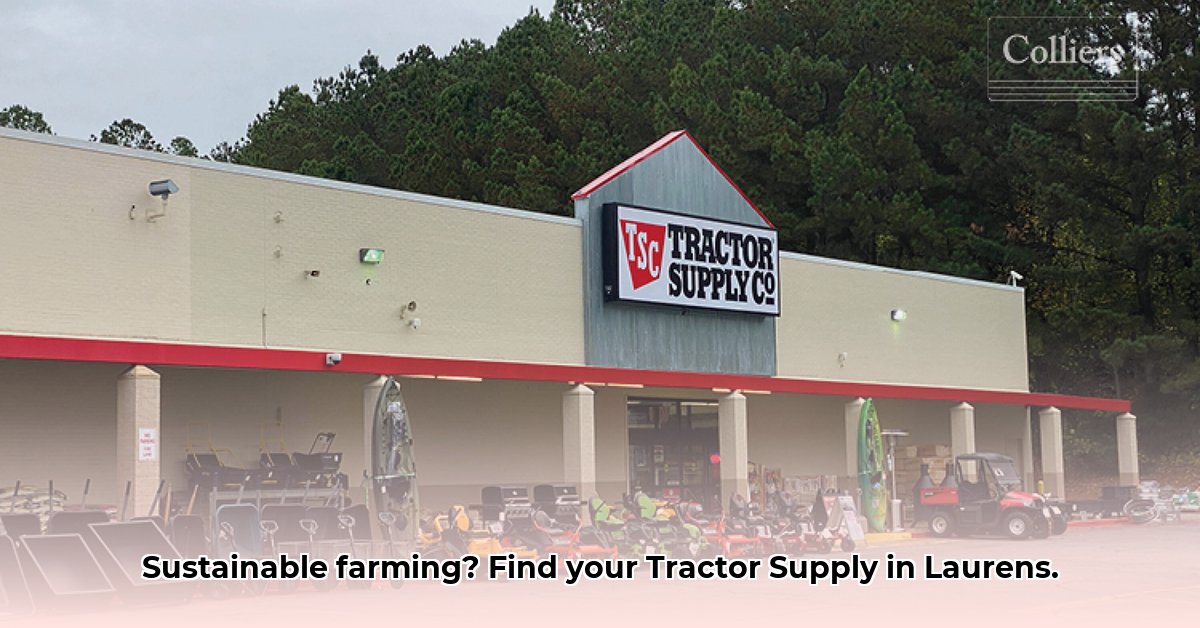
Finding the resources you need for sustainable farming can be challenging. But if you're in Laurens, South Carolina, Tractor Supply (TSC) offers a surprising number of options. For soil amendment options, consider checking out lime options. This article explores how TSC can support your sustainable agriculture efforts, highlighting both its strengths and limitations. We'll provide practical advice on maximizing its resources and suggest ways TSC and the community can further enhance their contribution to sustainable farming.
Tractor Supply in Laurens: A Local Hub for Sustainable Practices
Tractor Supply in Laurens is more than just a retail store; it's a vital resource for the rural community. Its extensive inventory—from animal feed and fencing to gardening tools and clothing—provides a one-stop shop for many farming needs. This centralized location reduces travel time and associated carbon emissions, contributing positively to sustainable practices. However, its role in truly sustainable agriculture requires a more nuanced examination. While TSC offers products relevant to sustainable farming (such as water-saving irrigation systems), it doesn't exclusively stock USDA-certified organic products. This reflects its broader market appeal but underscores the need for careful product selection.
The Human Element: Harnessing Local Expertise
A key strength of TSC lies in its staff. Often possessing significant experience in farming and gardening, they offer invaluable advice on techniques like efficient irrigation, responsible fertilizer use, and environmentally conscious pest management strategies. This practical knowledge forms an often-underestimated pillar of building sustainable agricultural practices within the Laurens community. How can this local knowledge best be harnessed for the greater good? It's a question worth exploring.
Actionable Steps for a More Sustainable Future
To fully leverage TSC for sustainable agriculture, both the company and its customers can adopt several key strategies.
For Tractor Supply Company:
- Expand Organic and Sustainable Product Lines: Increasing the variety of certified organic seeds, fertilizers, and pest control options would greatly enhance TSC's contribution to sustainability. This would directly respond to growing consumer demand for eco-friendly alternatives.
- Prioritize Supply Chain Transparency: Providing detailed information on product origins and production methods builds consumer trust and appeals to environmentally conscious shoppers. Knowing where products come from allows for more informed purchasing decisions.
- Foster Community Partnerships: Collaboration with local sustainable agriculture organizations promotes awareness, provides valuable feedback on product needs, and fosters educational opportunities. This synergistic approach delivers mutual benefits.
For Farmers and Gardeners:
- Engage with Staff Expertise: Don't hesitate to ask staff for advice on resource management and eco-friendly techniques. Their practical experience is a significant asset. A simple question can often yield significant insights.
- Implement Sustainable Practices: Employ water-wise irrigation, choose pest control options carefully, and consider composting and waste-reduction methods. These practices have a cumulative positive effect.
- Communicate Your Needs: Provide feedback to TSC regarding sustainable product demands. Customer demand is a powerful driver of change.
For Local Governments:
- Invest in Sustainable Agriculture Programs: Funding and promoting programs that support sustainable farming practices and educate local farmers strengthens the community's agricultural foundation. Public investment can often leverage private sector innovation.
- Partner with Tractor Supply: Collaboration between local government and TSC could facilitate educational workshops and expand access to needed resources among local farmers. A collaborative approach can amplify impact.
A Balanced Perspective: Weighing the Pros and Cons
TSC's role in promoting sustainable agriculture in Laurens presents both advantages and drawbacks:
| Pros | Cons |
|---|---|
| Convenient location and extensive product selection | Limited range of explicitly certified organic products |
| Knowledgeable staff providing practical advice and support | May not cater to aspects of large-scale, high-tech sustainable farming |
| Reduced transportation emissions | Supply chain transparency could be improved. |
| Indirect support of local farmers through sales of supplies | Focus predominantly on smaller-scale operations |
The Path Forward: Collaborative Sustainability
TSC's contribution to sustainable agriculture in Laurens is evolving. Its potential to become a significant partner in this effort depends on its responsiveness to market demands, its investment in eco-friendly product lines, and its cultivation of stronger relationships with local farmers, community groups, and the government. By adopting a collaborative approach, TSC can significantly impact the creation of a thriving and sustainable agricultural future in Laurens. The journey towards a greener agricultural landscape is a continuous process, requiring ongoing commitment and collaboration.